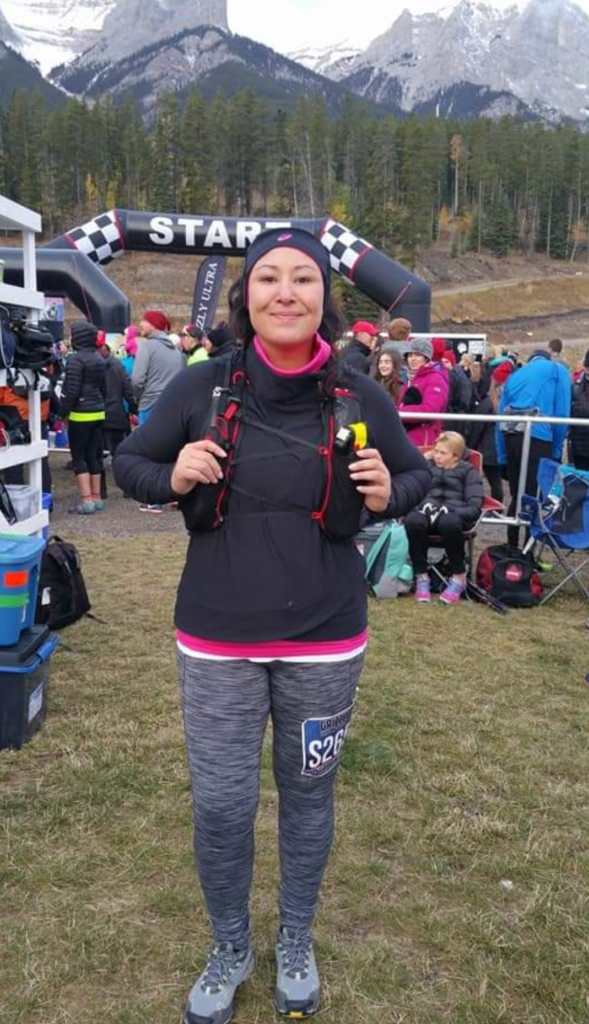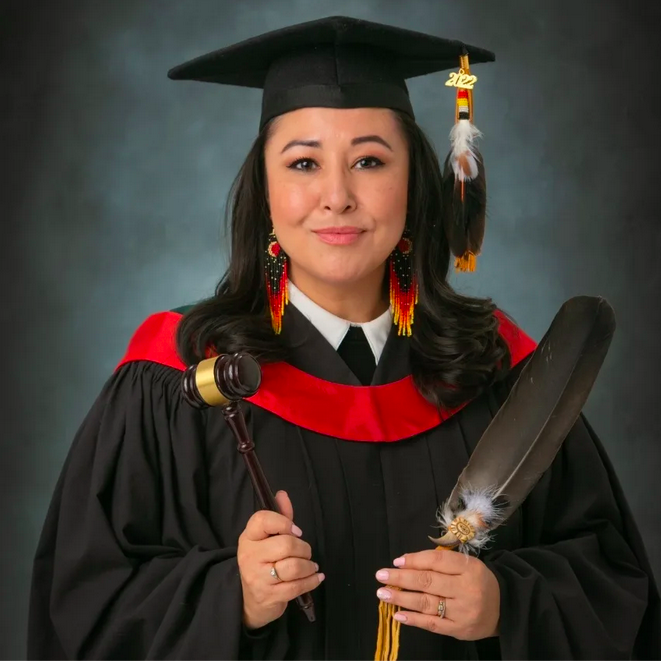First Nations lawyer and ultrarunner Anita Cardinal is fighting to overcome the odds and help her community.
It is a late Canadian summer day in 2018. Nêhiyaw (Cree) ultrarunner Anita Cardinal is trudging her way up to 6,519 feet, the summit of Grande Mountain in west-central Alberta. A brutal sun beats down from a cloudless sky, zapping Cardinal as she makes the long ascent. It is the final push of the Near Death Marathon, a 44-kilometer trail race in the Canadian Rockies that climbs some 6,995 feet of elevation and traces the first two legs of the 118-kilometer Canadian Death Race.
Between the unbearable heat and the punishing climbs, Cardinal’s legs and mind are cooked. Uncertainty seeps into the recesses of her cracking resolve. With only nine hours to complete the course, Cardinal begins to wonder whether or not she’ll finish in time.
Just keep running, she tells herself. What if you make it? It doesn’t seem likely you will, but what if? Just keep pushing. What if?

Oscillating between doubt and determination, Cardinal keeps moving forward, one foot in front of the other. She thinks back to her first ultra in 2015, the Grizzly Ultra 50K she DNF’d in the last 5K of the race. She remembers a fellow racer telling her, “don’t quit unless you’re proud,” which kept Cardinal moving to the finish line, even though she didn’t make the time cutoff.
That advice has always spoken to Cardinal. As a mother of three and a middle-aged law student, if there is one thing she knows best, it is the art of dogged perseverance. There is little that Cardinal starts that she does not finish. So, she leans in and embraces the effort. Steadily, one by one, the miles tick by until Cardinal is at the finish line with seven-and-a-half minutes left on the clock.
“I just broke down. It was the most incredible, beautiful feeling,” Cardinal says. “Don’t quit unless you’re proud. That’s how I’ve lived my entire life.”
A member of the Woodland Cree First Nations #474, Cardinal grew up on Treaty 8 territory in Alberta. Running was the marrow of her existence, a love of which she shared with her father Tom Cardinal. Tom ran everywhere. As a hunter, Tom ran to check his traps. Cardinal says he would run from trap line to trap line, often covering daily distances of 40-60 kilometers in a pair of rubber boots.
Tom’s feet were often his only means of transportation, but more than that, they provided him with a vehicle for joy and connection to the land. Before Cardinal was born, Tom would often run 20-kilometers one-way just to visit her mother. At a local 25-mile Walk-a-thon, Tom opted to jog the marathon distance instead. Cardinal still has the newspaper clipping of the story that was later published. There’s a photo of Tom, then in his early 20s, his lean frame dressed neatly in a white long-sleeve tee shirt, jeans, and a pair of moccasins. Tom was “limping,” the story read, “but otherwise unruffled by his 25-mile jog.”
“We ran everywhere because my dad ran everywhere,” Cardinal says. “My love of running came from my father for sure. It’s in our blood.”
Whether on the track or in the classroom, young Cardinal was a quick student. Smart. Competitive. Driven. Beside her junior high yearbook photo, Cardinal wrote, “to be an actress or lawyer” as her ambition, aspirations she all but set aside when she gave birth to her first son at age 17. But even then, Cardinal continued to chip away at her goals. When she wasn’t working to provide as a single mother, she took classes at the local community college. She would become a lawyer. It was what she was supposed to do. She knew this as deeply as she felt her love of running. And like running, that deep-seated knowing, that need to fight for justice, was born out of her own family’s experiences.
From an early age, Cardinal recognized there were obstacles — political, economical, social, psychological — that existed for her, an Indigenous woman, that did not exist for her non-Indigenous friends. Had she been born a few decades earlier, her own career ambitions might have never been possible. Prior to 1954, when William Wuttunee became Canada’s first status Indian lawyer, Indigenous people could not hire a lawyer without the government’s consent. Due to historical “enfranchisement” laws in Canada, if an Indigenous person like Cardinal had wanted to pursue law, she would have been required to renounce her indigeneity first.
That knowledge, combined with hundreds of years of government-sanctioned oppression and violence towards First Nations, weighed on Cardinal. Intergenerational trauma hung heavy over her community. Her own grandparents were residential school survivors. Her father endured years at the local Indian Day School. Her mother, Cardinal later learned, was one of many First Nations women who were forced into sterilization under Alberta’s Sexual Sterilization Act of 1928.
“As I got older I started to realize that, as Indigenous people in Canada, there are a lot of barriers facing us,” she says. “There are so many injustices within the legal system as well. [The system] has tried to destroy us and hurt us in so many ways. How could I not fight for justice, for equity for our people? It’s always been in my heart. Everything I do is to bring justice to my community. That’s the life I want to live.”
In 2012, Cardinal became a paralegal and started working on major cases related to Indigenous rights, including the Sixties Scoop, Newfoundland and Labrador Residential School Claim, and Forced Sterilization. The fight is personal: her mother is a Representative Plaintiff in the Forced Sterilization case.
In the spring of 2021, when the unmarked graves of more than 1,000 Indigenous people, mostly children, were discovered at three former residential school sites, Cardinal felt at once broken and emboldened. By then, she was approaching her final year of law school at the University of Alberta. At 45 years old, she was the only student in her class who was a grandmother, a fact she says she was proud to admit. The news of those horrific discoveries — and the knowledge that those remains were just the beginning — felt as painful as if it’d been her own children in those graves.
“Heartbroken doesn’t begin to describe the collective grief we felt, and the grief I felt was compounded by so many other things, especially looking at my kids and my grandson, thinking that could have been them, that could have been me,” Cardinal says. “I wanted to do something that brought people together, forced everyone to acknowledge this, because we can’t forget it, we have to keep that awareness. Whatever we can do to make sure [residential school victims and survivors] are never forgotten, I am compelled to do that because I can’t not. And I found running can do that.”
On September 30th, 2021, Canada’s National Day for Truth and Reconciliation, Cardinal organized the inaugural Every Child Matters Run & Walk in Edmonton, Alberta. Over 600 people showed up to the 5K/10K event, which raised $10,000 for local charities like the Indian Residential School Survivors Society.

Cardinal says honor-running for her ancestors who did not survive the residential school era, as well as those who did, has been an important part of her healing journey. Now, it’s something she wants to help other Indigenous people find, too. Later this fall, a month after the second annual Every Child Matters Run & Walk, Cardinal will join the Native Women Running (NWR) team at the Javelina Jundred, where she will run the 100K distance, her longest trail race to date. For Cardinal, the NWR community has become a beacon of positivity. That visibility and representation NWR provides has played a crucial role in helping her find her own place within the running world. That rootedness in movement, in belonging, in tradition, is one she hopes her grandson, who also loves to run, will be able to benefit from as he grows older.
“You can’t run away from who you are,” Cardinal says. “I’ve done the most growing that I’ve ever been able to do because of running, because out there, you are faced with your ugliest self as well as your best. You go through every fear you’ve ever had, every doubt you’ve ever had, and you work through all of those things. Running has been a source of healing for me. It’s been a way to connect to the land, a celebration of traditional ways, and [a return] to ceremony for me. I am a better person because of running.”

In April 2022, Cardinal received her Juris Doctor from the University of Alberta Faculty of Law. She is currently a student-at-law at the law firm Cooper Regal. To learn how you can support this year’s Every Child Matters Run & Walk, visit the event’s website or follow @indigenousrunner on Instagram.
Awesome, good morning, ya’ah’teeh abini doo’ nizhoni. Congratulations on your achievement and your peoples representation. I am sure you have a clan and going forward also running for a healthier nation. Its good to see you featured as a indigenous woman standing up for your morals and supporting running with your community and people. Keep it up. Ahxe’hee.